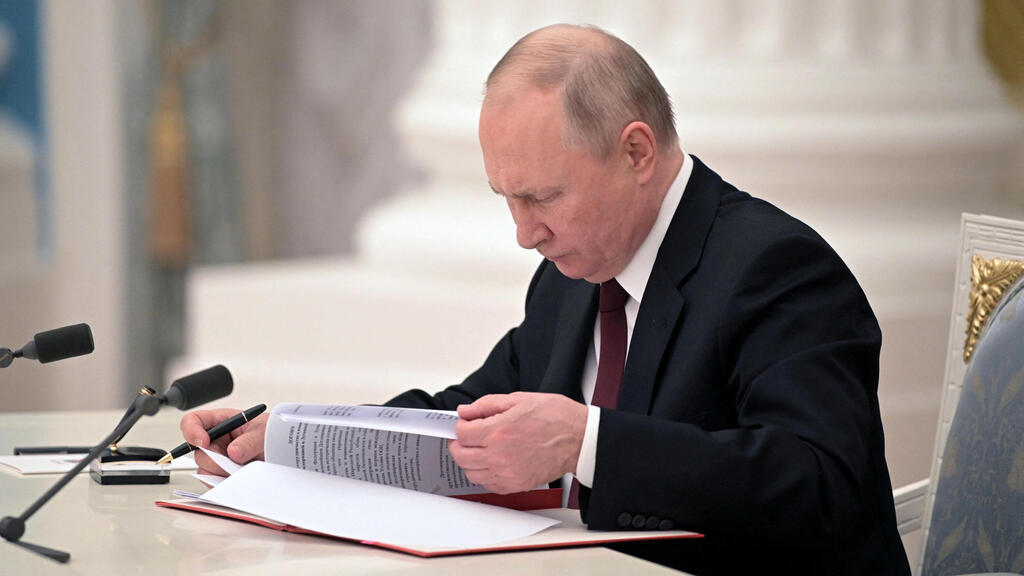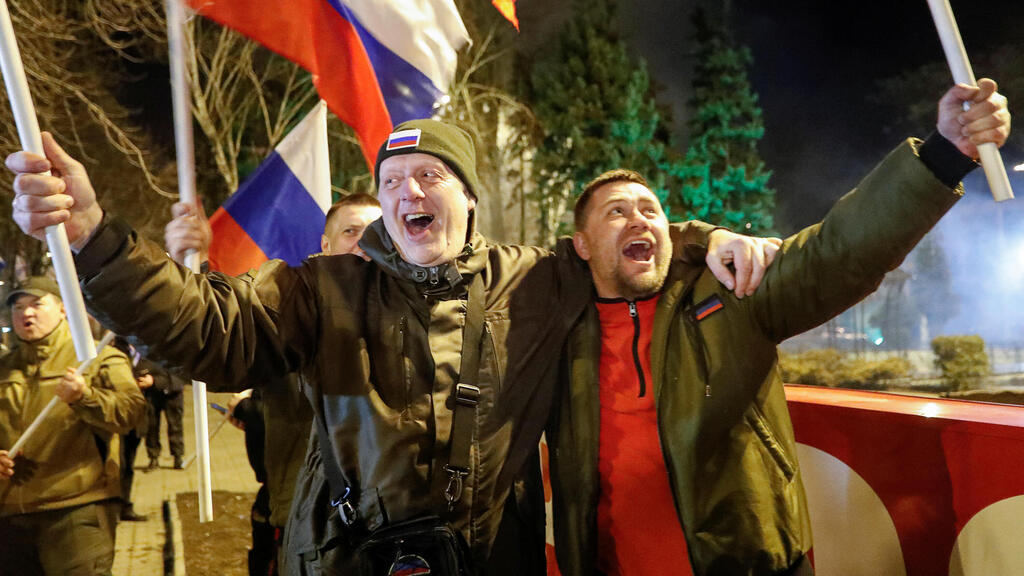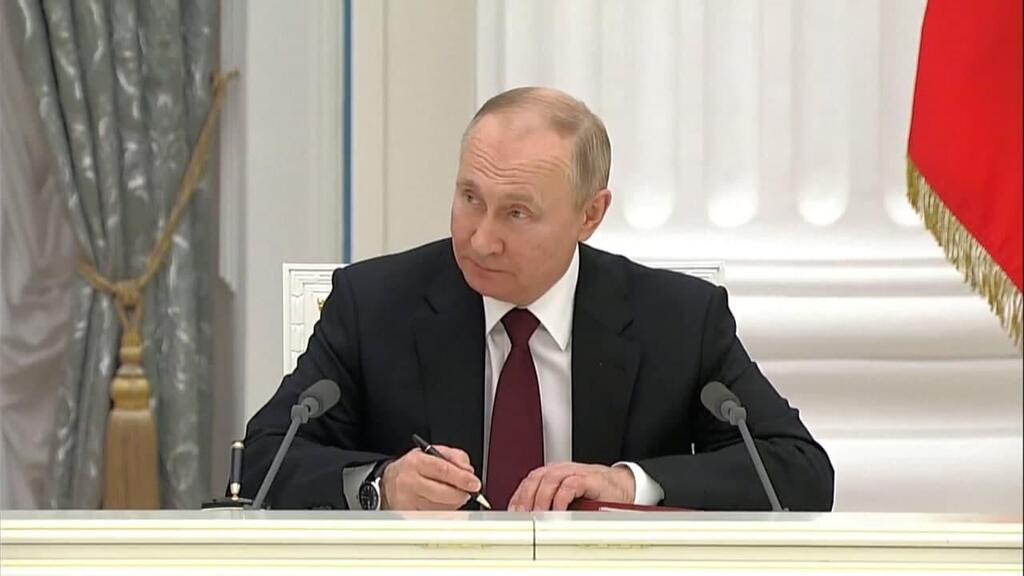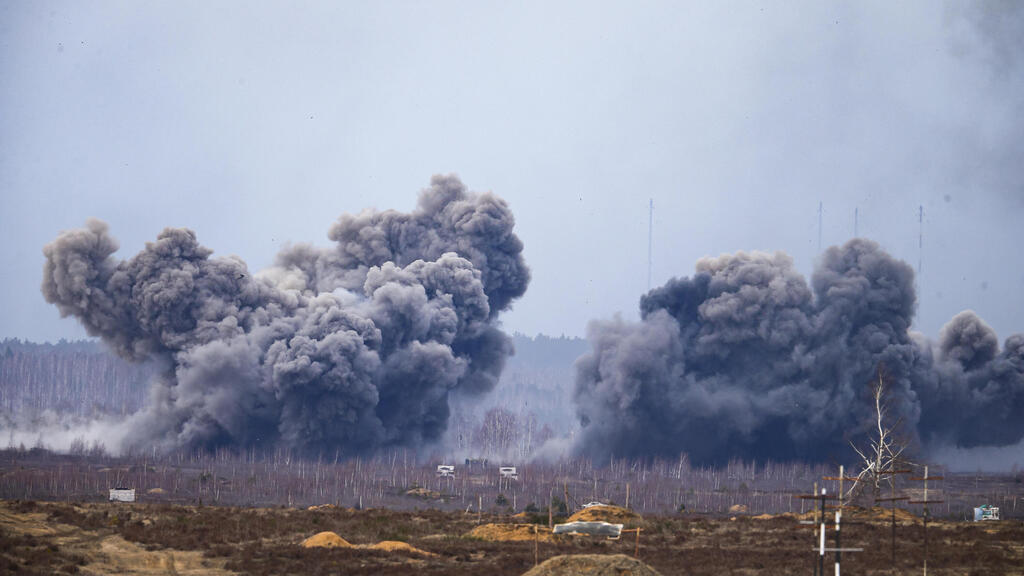Getting your Trinity Audio player ready...
Russian President Vladimir Putin on Monday recognized the independence of separatist regions in eastern Ukraine and paved the way to provide them military support a direct challenge to the West that will fuel fears that Russia could imminently invade Ukraine.
The carefully staged move announced in the Kremlin could lead to new sanctions on Russia and flies in the face of European efforts for a diplomatic solution to the escalating crisis, which has brought East-West relations to a new low and jeopardized trade. Britain's prime minister called it a "breach of international law."
It came amid a spike in skirmishes in the eastern regions that Western powers believe Russia could use as a pretext for an attack on the western-looking democracy that has defied Moscow's attempts to pull it back into its orbit.
The White House said President Joe Biden will issue an executive order soon that will prohibit "new investment, trade, and financing by U.S. persons to, from, or in" the two breakaway regions of eastern Ukraine, after a telephone conversation between Biden and Ukraine President Volodymyr Zelenskiy.
The order signed by the Russian president, will "provide authority to impose sanctions on any person determined to operate in those areas of Ukraine," White House spokesperson Jen Psaki said in a statement.
British Prime Minister Boris Johnson said Putin's move is a breach of international law. The UK will announce sanctions on Russia on Tuesday.
NATO Secretary-General Jens Stoltenberg on Monday condemned Russia for recognizing as independent the breakaway regions in eastern Ukraine, accusing Moscow of creating a pretext for a new invasion.
"Moscow continues to fuel the conflict in eastern Ukraine by providing financial and military support to the separatists. It is also trying to stage a pretext to invade Ukraine once again", Stoltenberg said.
Putin justified his decision in a far-reaching, pre-recorded speech blaming NATO for the current crisis and calling the U.S.-led alliance an existential threat to Russia.
Sweeping through more than a century of history, he painted today's Ukraine as a modern construct that is inextricably linked to Russia. He charged that Ukraine had inherited Russia's historic lands and after the Soviet collapse was used by the West to contain Russia.
Ukrainians shrugged off the move as meaningless, but it remains a fundamental blow to their country eight years after fighting erupted the Donetsk and Luhansk regions between Russia-backed separatists and Ukrainian forces.
After his speech, Putin signed decrees in the Kremlin recognizing those regions' independence and called on lawmakers to approve measures paving the way for military support.
4 View gallery


Vladimir Putin signs declaration recognizing break away regions of Ukraine as part of Russia on Monday
(Photo: Reuters)
Until now, Ukraine and the West have accused Russia of supporting the separatists, but Moscow has denied that, saying that Russians who fought there were volunteers.
European leaders had urged Putin to not to recognized the regions' independence, and the EU foreign policy chief threatened possible sanctions if he did. Ukraine's president convened an emergency meeting of top security officials.
According to the Kremlin, German Chancellor Olaf Scholz and French President Emmanuel Macron voiced "disappointment with such a development" but also "readiness to continue contacts."
At an earlier meeting of Putin's Security Council, a stream of top Russian officials argued for recognizing the separatist regions' independence. At one point, one slipped up and said he favored including them as part of Russian territory - but Putin quickly corrected him.
With an estimated 150,000 Russian troops massed on three sides of Ukraine, the U.S. has warned that Moscow has already decided to invade. Still, the American and Russian presidents tentatively agreed to a possible meeting in a last-ditch effort to avoid war.
4 View gallery


Ukrainian separatists celebrate Russian recognition of breakaway regions on Monday
(Photo: Reuters)
If Russia moves in, the meeting will be off, but the prospect of a face-to-face summit resuscitated hopes that diplomacy could prevent a devastating conflict, which would result in massive casualties and huge economic damage across Europe, which is heavily dependent on Russian energy.
European Union foreign policy chief Josep Borrell said at an EU foreign ministers meeting in Brussels that, "If there is a recognition, I will put sanctions on the table and the (EU) ministers will decide" whether to agree to impose them.
Even as the diplomatic efforts inched forward, potential flashpoints multiplied. Sustained shelling continued Monday in Ukraine's east. Unusually, Russia said it had fended off an "incursion" from Ukraine which Ukrainian officials denied. And Russia decided to prolong military drills in Belarus, which could offer a staging ground for an attack on the Ukrainian capital, Kyiv.
Putin's announcement shatters a 2015 peace deal signed in Minsk requiring Ukrainian authorities to offer a broad self-rule to the rebel regions, which marked a major diplomatic coup for Moscow.
The deal was resented by many in Ukraine who saw it as a capitulation, a blow to the country's integrity and a betrayal of national interests. Putin and other officials argued Monday that Ukrainian authorities have shown no appetite for implementing it.
With the prospect of war looming, French President Emmanuel Macron scrambled to broker a meeting between U.S. President Joe Biden and Putin, who denies he plans to attack Ukraine.
Russia says it wants Western guarantees that NATO won't allow Ukraine and other former Soviet countries to join as members and Putin said Monday that a simple moratorium on Ukraine's accession wouldn't be enough. Moscow has also demanded the alliance halt weapons deployments to Ukraine and roll back its forces from Eastern Europe, demands flatly rejected by the West.



